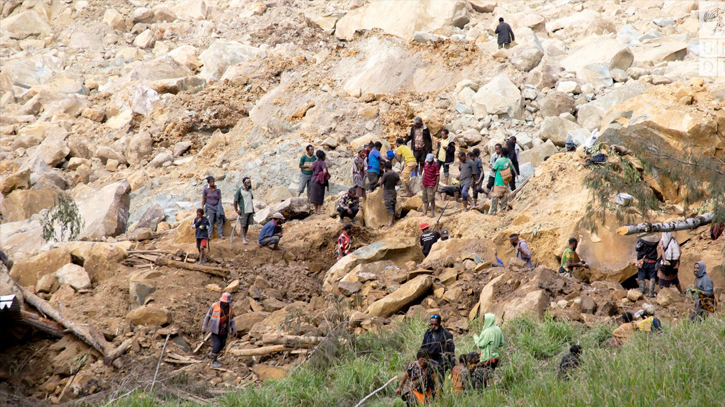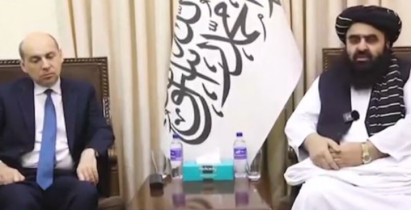
Photo: Collected
In the wake of the devastation caused by a massive landslide in Papua New Guinea (PNG) last week, an indigenous activist from the affected local communities explained how the disaster could disrupt the livelihood of those who survived and why she would continue to advocate for the local communities, especially for the vulnerable women.
DISRUPTING LIVELIHOOD
When a powerful earthquake hit a mountainous area in Maip Muritaka, located in the Enga Province in western PNG, in the early hours of Friday (31 May), it triggered a massive landslide that brought huge rocks and mud tumbling through villages sitting at the bottom of the mountains.
The National Disaster Center in the country estimated that more than 2,000 people could have been killed in the landslide, which buried over 150 homes in the villages.
"The disaster happened at around 3am in the morning on Friday. The villagers were still sleeping in their homes and then the earth rumbled. It was a rocky mountain with grass growing on it. When the earth rumbled in the morning, the rocks just broke off and covered the villages beneath the mountain. There were three villages. They’re three tribes under the same clan," Cressida Kuala, an indigenous activist from the Yanjakale village, located a few miles away from the villages hit by the landslide, told Sputnik.
One of Kuala’s close friends is from the Yambali village that was buried during the landslide.
"His mom lived in that area and is probably dead. We’re used to landslides. We live in a mountainous area with a lot of stony mountains. But we have never experienced such a disaster like the one happened in Muritaka," she said.
The only highway that connects the villages with the rest of the country was blocked after the landslide, making it much more difficult for disaster relief teams and basic essential supplies to reach the affected areas.
"The disaster covered a big width and length of the highway. That’s the only highway we use to transport goods and services to the villages. It’s not just about the massive rocks that blocked the highway. The highway itself is also about 12 meters (about 40 feet) wide. It’ll take time to clear it," Kuala said.
According to the activist, the livelihood of people living in the affected villages depended on the traffic on the highway.
"They have guesthouses for businessmen traveling through the highway. If they want to stop and have a rest, they can go to the club and have a beer. These are all gone. The villagers also grow vegetables, sweet potatoes and carrots. And they set up small stores or work as street vendors along the highway. This is the norm in our society. For the villages in the area, we have one highway that connects us together. The disaster has really caused a lot of damage to properties. It disrupted transportation of goods and services. People will face poverty after this," Kuala said.
RESOLUTE ADVOCACY
The highway through the villages affected in the landslide was also a key transportation corridor for the famous Porgera Gold Mine, which began operating in 1990.
Although the gold mine became an important contributor to the local economy in the surrounding villages by providing jobs and bringing more traffic to the highway, the mining operations also had a huge impact on the livelihood of the indigenous population, especially vulnerable women like Kuala.
"I was an employee of the mining company as well. I worked with them from 2005 to 2012. When I tried to monitor how the waste and other chemical byproducts were discharged into the waterways and river systems in the area, they attacked me in the workplace. Two guys physically assaulted me. I was physically assaulted and sexually assaulted. That’s when I left my job," Kuala, 43, said.
Kuala quickly understood that many other women from the nearby villages faced similar traumatic experiences as she did.
"The mine workers employed by the company have mistreated women who lived in the vicinity. When those women were caught near the mine dump site scavenging for rocks or precious minerals like gold, the workers would ask them if they wanted to go to jail or they offer sexual favors to the workers. The ladies didn’t want their husbands to know. They would give their bodies to the security workers at the mine. This has been happening over the years. That’s why I stood up for the women who had been victims of sexual abuse. Many indigenous women from the area came to tell their stories of being raped and physically assaulted," Kuala said.
That was also why Kuala founded the Porgera Red Wara (River) Women's Association and tried to support other female victims from the area.
"When I was physically assaulted and sexually assaulted, that gave me strength to stand up and speak, because there was no other voice for the victims in the area. I not only spoke up about it. I also wrote missions statements about what happened to the lives of women, especially young girls, in the area. There are about 189 women from our district that became members of my association. We have about over 6,000 members from other districts," she said.
Kuala’s efforts paid off as her work received international recognition and she was invited to take part in human rights panel discussions hosted by the United Nations. She is also preparing to travel to Hawaii in the United States in the near future to participate in a program focused on indigenous women.
ACTIVE RESPONSE
Nevertheless, after the shocking devastation caused by the landslide, Kuala called on the government in the country to take a proactive approach in handling the disaster.
"The national government, the provincial government and the local government are not really active in responding to the disaster. They only came in with an official from the Australian government five days after the disaster. They acted late. And I’m not really happy with them," she said.
The activist pointed out the ongoing political crisis in the country could further hinder disaster relief efforts.
"At the moment, the government is going through a vote of no confidence to change the prime minister of the country. This political crisis has affected the people of Papua New Guinea. Whatever the government is doing, they’re too focused on the political affairs. They should have responded quickly to the disaster. In other countries I’ve traveled to, I realized that they have an emergency response fund available to send out the rescue teams quickly and provide food, shelter and clothing. It’s a shame to see our government acted so late," she said.
At the same time, the activist noted that rescue and recovery efforts after the landslide would require a delicate approach to adhere to local traditions.
"We have to be very careful when trying to remove the rocks away from the area because we may find dead bodies buried under. We have to be very careful when trying to dig the remains out and try not to disturb or disrespect the victims. They can’t dig with an excavator or something like that, because they could cut a dead body when trying to remove it. In our tradition, we don’t burn the bodies. We only bury the bodies," Kuala said.
Messenger/Mumu








